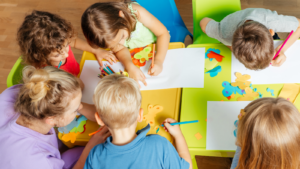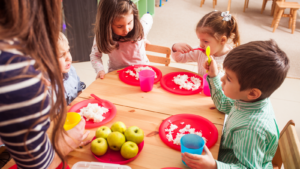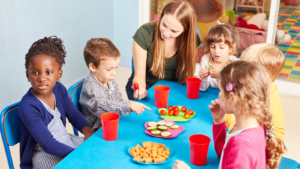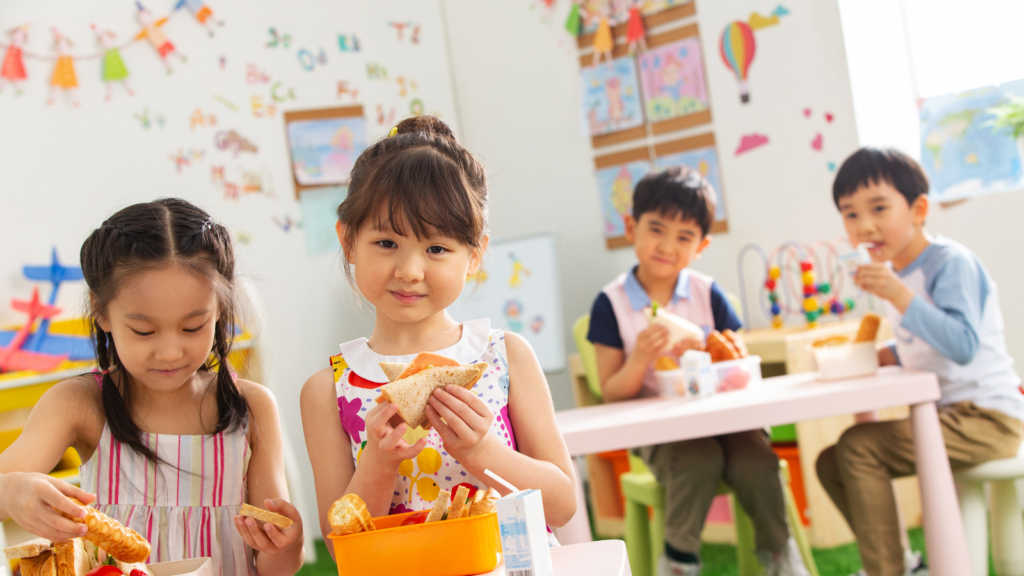Imagine a world where kindergarteners understand the value of nutrition and make healthy food choices. It’s not a dream—it’s completely attainable. This article will delve into the captivating world of nutrition lesson plans tailored for kindergarten students.
Nutrition Lesson Plans for Kindergarten
 Nurturing nutrition knowledge in young minds improves cognition and fosters healthier dining decisions in the long run. With a strategic nutrition lesson plan, nutritional wisdom cultivates, guiding kindergarteners to make informed food choices.
Nurturing nutrition knowledge in young minds improves cognition and fosters healthier dining decisions in the long run. With a strategic nutrition lesson plan, nutritional wisdom cultivates, guiding kindergarteners to make informed food choices.
A robust nutrition plan encompasses several pivotal components. It involves teaching the basics of a balanced diet, incorporating food groups, and teaching the importance of portion control. Sample meals strengthen understanding— for example, breakfast might include whole grain cereal, a piece of fruit, and a glass of milk. Interactive activities make learning enjoyable and effective, as art projects centered around different food groups, or playing games like “nutrition bingo”.
Tailoring Lesson Plans to Meet Dietary Guidelines
Adhering to dietary guidelines demarcates a successful nutrition lesson plan for kindergarten. It ensures kindergarteners grasp the essentials of nutrition while abiding by the prescribed dietary standards. For instance, lesson plans elucidate the significance of consuming fruits, vegetables, whole grains, and lean protein, as emphasized in the United States Department of Agriculture’s (USDA) MyPlate initiative. Applying hands-on learning; like creating a mini grocery store or designing a healthy food plate, enacts practical understanding of these guidelines.
Making Learning Fun: Activity-Based Nutrition Lessons
Offer engaging, purposeful activities centered on nutrition that incentivize curiosity and exploration are a key part of nutrition education for kindergarten students.
Incorporating Hands-On Cooking Activities
 In the realm of nutrition education, hands-on cooking activities provide an experiential learning environment in addition to theoretical knowledge. Simple recipes like making a fruit salad or designing a healthy sandwich involve students in the shopping, washing, preparation, and serving stages. These engaging activities introduce children to different food textures, smells, and tastes all while associating the process with fun and playtime. The Association of Nutrition and Foodservice Professionals suggests these activities create an autonomous relation towards healthy food habits.
In the realm of nutrition education, hands-on cooking activities provide an experiential learning environment in addition to theoretical knowledge. Simple recipes like making a fruit salad or designing a healthy sandwich involve students in the shopping, washing, preparation, and serving stages. These engaging activities introduce children to different food textures, smells, and tastes all while associating the process with fun and playtime. The Association of Nutrition and Foodservice Professionals suggests these activities create an autonomous relation towards healthy food habits.
Encouraging Picky Eaters: Introduction to Diverse Foods
Introducing children to a wide array of foods piques their interest, making them more likely to try new foods. Using colorful charts, playing nutrition-themed games, or creating puppet shows around food diversity can break the monotony of stereotypical methods. For example, the American Dietetic Association’s “Color Your Plate” initiative instigates children to incorporate a variety of colorful fruits and vegetables in their plates. Teachers note that these strategies facilitate a positive attitude in picky eaters, embracing diverse food options.
Developing a Well-Rounded Curriculum: Incorporating Physical Activities
Enhancement of the kindergarten curriculum with physical activities complements nutrition lessons, reinforcing their impact.
Importance of Combining Nutrition and Exercise
Exercise fortifies the nutrition education provided to kindergarten pupils. It amplifies the understanding of healthy eating by signifying its role in supplying the body with the energy it requires to be physically active. Regular workout routines, for instance, require consistent intake of nutrient-dense foods, sugar-free sports drinks, and a sufficient amount of water, emphasizing the role of proper nutrition.
Fun Physical Activities That Enhance Nutritional Learning
Inclusion of playful physical activities can render nutrition lessons more engaging and memorable. Take, for instance, a “Fruit and Vegetable Relay Race,” where students sort plastic foods into their respective categories, or a “Nutrition-themed Obstacle Course” that incorporates food-themed challenges. These activities allow children to apply their practical nutritional knowledge, thereby affirming and deepening their understanding.
Setting the Stage for a Healthy Future
 Implementing nutrition lesson plans for kindergarten students is critical for their early development. Tailored lessons focusing on key nutrients like omega-3 and iron can be effectively integrated through engaging activities such as cooking and interactive games. Tracking the impact of these plans is equally important, with educators playing a pivotal role in introducing nutritional topics using kid-friendly language and visual aids. Monitoring progress through various means helps in refining future strategies. Involving parents through regular meetings ensures a holistic approach to nutrition education. So, it’s clear that a well-rounded nutrition lesson plan can make a significant difference in kindergarteners’ understanding of healthy eating habits, setting the foundation for a healthier future.
Implementing nutrition lesson plans for kindergarten students is critical for their early development. Tailored lessons focusing on key nutrients like omega-3 and iron can be effectively integrated through engaging activities such as cooking and interactive games. Tracking the impact of these plans is equally important, with educators playing a pivotal role in introducing nutritional topics using kid-friendly language and visual aids. Monitoring progress through various means helps in refining future strategies. Involving parents through regular meetings ensures a holistic approach to nutrition education. So, it’s clear that a well-rounded nutrition lesson plan can make a significant difference in kindergarteners’ understanding of healthy eating habits, setting the foundation for a healthier future.

